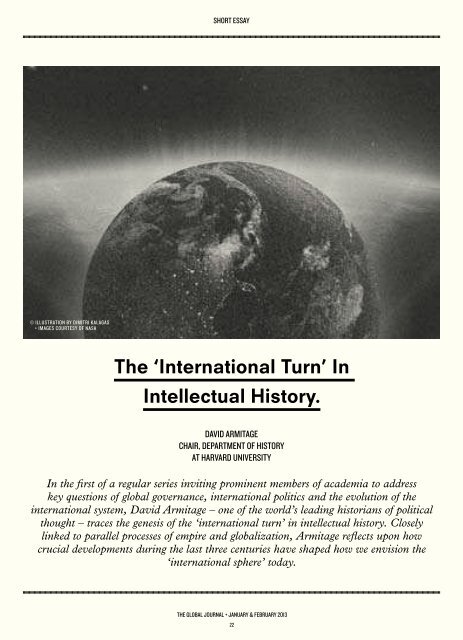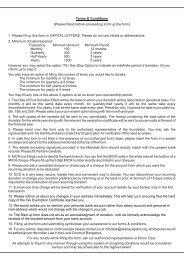The Top 100 NGOs 2013. - Akshaya Patra
The Top 100 NGOs 2013. - Akshaya Patra
The Top 100 NGOs 2013. - Akshaya Patra
Create successful ePaper yourself
Turn your PDF publications into a flip-book with our unique Google optimized e-Paper software.
© illusTraTion By DimiTri kalagas<br />
+ images courTesy oF nasa<br />
shorT essay shorT essay<br />
<strong>The</strong> ‘International Turn’ In<br />
Intellectual History.<br />
DaviD armiTage<br />
chair, DeParTmenT oF hisTory<br />
aT harvarD universiTy<br />
In the first of a regular series inviting prominent members of academia to address<br />
key questions of global governance, international politics and the evolution of the<br />
international system, David Armitage – one of the world’s leading historians of political<br />
thought – traces the genesis of the ‘international turn’ in intellectual history. Closely<br />
linked to parallel processes of empire and globalization, Armitage reflects upon how<br />
crucial developments during the last three centuries have shaped how we envision the<br />
‘international sphere’ today.<br />
<strong>The</strong> gloBal Journal + January & FeBruary 2013<br />
that is solid melts into air, all that is holy is<br />
profaned, and man is at last compelled to face<br />
“All<br />
with sober senses his real conditions of life, and<br />
his relations with his kind.” <strong>The</strong>se words, taken from Karl<br />
Marx and Friedrich Engels’ Communist Manifesto, that<br />
prescient analysis of proto globalization, prophesied an end<br />
to boundaries that was driven to its extreme a century and<br />
a half later by Francis Fukuyama’s vision of markets and<br />
free-trade zones ending national and local identities for good.<br />
Capitalism, liberal democracy and globalization had won,<br />
once and for all. Or so it seemed in 1992.<br />
No more. <strong>The</strong> dissolving boundaries of the Eurozone<br />
Crisis have called into question the promises of unlimited<br />
assimilation by capitalism. Around the world, a plague<br />
of economic fracturing has split globalized capital. <strong>The</strong><br />
smoothly integrated globe predicted by Fukuyama has broken<br />
apart into Eurozone South and North, the Asian trading<br />
enclaves, and the socialist states of Latin America: what was<br />
supposed to be solid has dissolved into air.<br />
‘<strong>The</strong> first historians who<br />
argued for transnational<br />
spaces were deeply invested<br />
in the Enlightenment<br />
conception of a mind free<br />
from its body.’<br />
A new age of geopolitical exclusion and boundary-making as<br />
rampant as the 19th century spread of national governments<br />
is upon us. Fractures between Europe’s old economic<br />
powerhouses and its new pauper states have compounded<br />
Turkey and Iceland’s exclusion from the European Union<br />
(EU). Fears about terrorism and the loss of traditional values<br />
fan old prejudices into fresh anti-immigrant sentiments in<br />
the United States (US), France and the Nordic countries.<br />
Unapologetic semi-fascists are gaining political ground in<br />
Greece and Hungary. A new age of nationalisms threatens<br />
billions with exclusion from democracy, capitalism, credit, the<br />
Internet and human rights law. Can this age of proliferating<br />
boundaries be reversed?<br />
One hopeful story might be told about the fate of another<br />
set of boundaries – those associated with nationalism –<br />
during the course of the 20th century. By the 1950s,<br />
Western intellectuals were confronted with growing evidence<br />
about the negative role of nationalism in generating the<br />
massacres of the World Wars. Boundaries were amassing<br />
a nasty record of genocide, and someone had to reckon<br />
with facts.<br />
<strong>The</strong>gloBalJournal.neT<br />
22 23<br />
That reckoning amounted, for many learned people, to an<br />
overturning of cherished commitments. For much of the<br />
modern era, in most parts of the world, historians have<br />
been committed to nationalism. Like the majority of social<br />
scientists, they have assumed that history revolves around<br />
nations – large groups living in the same location who share<br />
a common ancestry, language, history or culture, and who<br />
organize themselves politically into states. Accordingly,<br />
historians’ main tasks have been to narrate how nation-states<br />
emerged, how they developed, and how they interacted with<br />
one another.<br />
Even those historians whose work deliberately crossed the<br />
borders of national histories operated along similar lines.<br />
For example, diplomatic historians used national archives to<br />
reconstruct relations among states. Historians of immigration<br />
tracked the arrival and assimilation of new peoples into<br />
existing states. And imperial historians studied empires<br />
as the extensions of national histories, even though they<br />
generally maintained a strict separation between the histories<br />
of metropolitan states (mostly in Europe) and their colonies<br />
(mostly outside Europe). In all these fields, the matter of<br />
history concerned stability, not mobility – what was fixed, not<br />
what was mixed.<br />
* * * * *<br />
Scholars in many fields have more recently been moving<br />
towards studies they describe variously as international,<br />
transnational, comparative and global. <strong>The</strong> scope,<br />
subject matter and motivation of their efforts has not been<br />
identical – nor is there any consensus on how these nonnational<br />
approaches to history should be distinguished from<br />
each other.<br />
<strong>The</strong> first historians who argued for transnational spaces were<br />
deeply invested in the Enlightenment conception of a mind<br />
free from its body. <strong>The</strong>y were historians of ideas. Early forms<br />
of the history of ideas were characteristic of the Republic of<br />
Letters, a 17th and 18th century intellectual community in<br />
Europe and the US that was self-consciously transnational.<br />
As one of its citizens, the French scholar and litterateur<br />
Bonaventure d’Argonne, wrote in 1699, the Respublica<br />
Literarum “embraces the whole world and is composed of all<br />
nationalities, all social classes, all ages, and both sexes. All<br />
languages, ancient as well as modern, are spoken.” Within a<br />
global community that extended from China to Peru, “ideas<br />
were colorless, ageless, raceless, genderless.” <strong>The</strong>y were<br />
placeless and stateless, too.<br />
Just like those global scholars and intellectuals who made up<br />
the Republic of Letters, we must think of categories beyond<br />
the national boundary. Most of the world’s population, for<br />
most of recorded history, lived not in nation-states but in<br />
empires – those far-flung, stratified polities that projected<br />
various kinds of universalism in order to suspend differences





